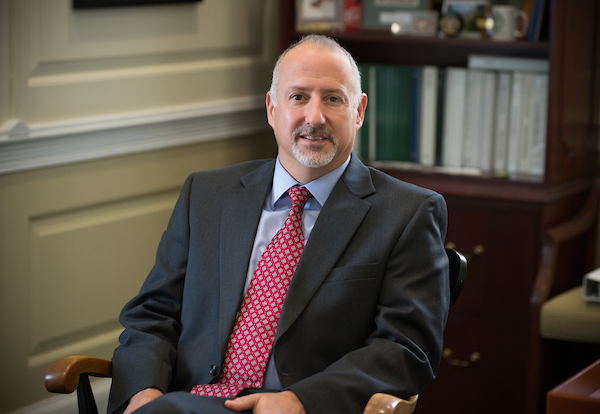
David Rosowsky is Senior Advisor to the President at Arizona State University and Senior Fellow of the University Design Institute. He also holds the Foundation Professorship in the Ira A. Fulton Schools of Engineering at ASU. Prior to joining ASU, Rosowsky served for three years as Vice President for Research at Kansas State University, one of the nation’s premier land grant and public research universities. In that role, Dr. Rosowsky had responsibility for research, innovation, and economic development at K-State and served as a member of the president’s cabinet.
As Vice President for Research, Rosowsky served as the university’s chief research officer, providing leadership and expertise in fostering a campus environment that promoted collaborative, interdisciplinary efforts and produced high-quality research and scholarly work. Rosowsky encouraged and facilitated the integration and enhancement of research, scholarly and creative activities across the university’s colleges and multiple research centers and led university-wide strategic research growth activities. Additionally, Rosowsky served as chair of the board of directors for K-State Innovation Partners, K-State’s hub of corporate engagement, technology commercialization and economic development.
Before joining K-State, Dr. Rosowsky served for six years as Provost & Senior Vice President at the University of Vermont. As UVM’s chief academic officer and the chief budget officer he worked closely with the President, the Board of Trustees, the deans, the vice presidents, and other members of the President’s cabinet. In his role as chief academic officer, Dr. Rosowsky had direct responsibility for the academic colleges and schools, the College of Medicine, UVM Extension, Continuing Education, student life and services, enrollment management functions, the university library, the university museum, and numerous offices, centers and programs. As the chief budget officer, he had responsibility for aligning resource allocation with strategic initiatives. He was responsible for enhancing the University’s intellectual climate, strengthening instruction and scholarship, advancing diversity, creating an outstanding student experience, promoting student access to success, and identifying investments and efficiencies to ensure a sustainable future.
Since 1990, Dr. Rosowsky has conducted research in the areas of structural reliability, performance of wood structural systems, design for natural hazards, stochastic modeling of structural and environmental loads, and probability-based codified design. His current research addresses three topics: (1) behavior of the built environment subject to natural hazards, (2) modeling and analysis of load effects on buildings and other structures with particular emphasis on complex environmental phenomena, and (3) performance-based engineering for design, post-disaster condition assessment, and loss estimation studies. He currently serves on the Editorial Board of the journal Structural Safety and is a past editorial board member of the ASCE Journal of Infrastructure Systems, the ASCE Journal of Structural Engineering and the journal Natural Hazards Review.
Dr. Rosowsky has authored or co-authored more than 170 papers in peer-reviewed journals and more than 150 papers appearing in conference proceedings. A recognized expert in the field of structural reliability, he has been invited to present his research work around the world including invited lecturers in France, Italy, Switzerland, Canada, Japan, Australia and New Zealand. He has supervised more than 20 Masters and Doctoral students. He is the recipient of the ASCE Walter L. Huber Research Prize, the T.K. Hseih Award from the Institution of Civil Engineers (UK), the ASCE Norman Medal, and the ASCE Ernest E. Howard Award.
Dr. Rosowsky remains active in in the structural reliability, wind engineering, and earthquake engineering communities and continues to supervise and co-advise graduate students and post-doctoral researchers. He is a member of numerous editorial boards, national technical committees, was a registered Professional Engineer in Texas, and holds the rank of Fellow of the American Society of Civil Engineers and Fellow of the Structural Engineering Institute. Rosowsky received the Bachelor of Science in Civil Engineering (BSCE) and Master of Science in Civil Engineering (MSCE) degrees from Tufts University, and the Doctor of Philosophy degree (Civil Engineering) from The Johns Hopkins University.